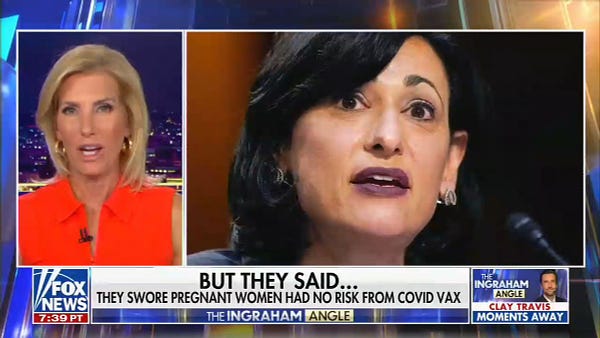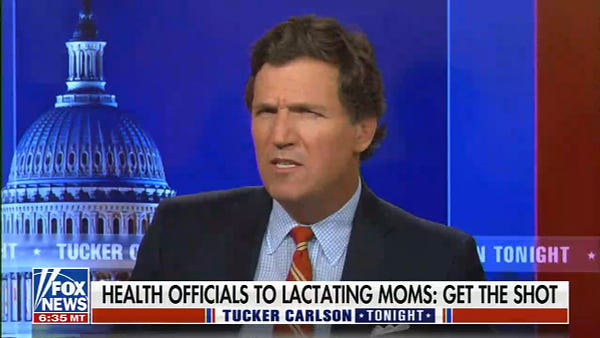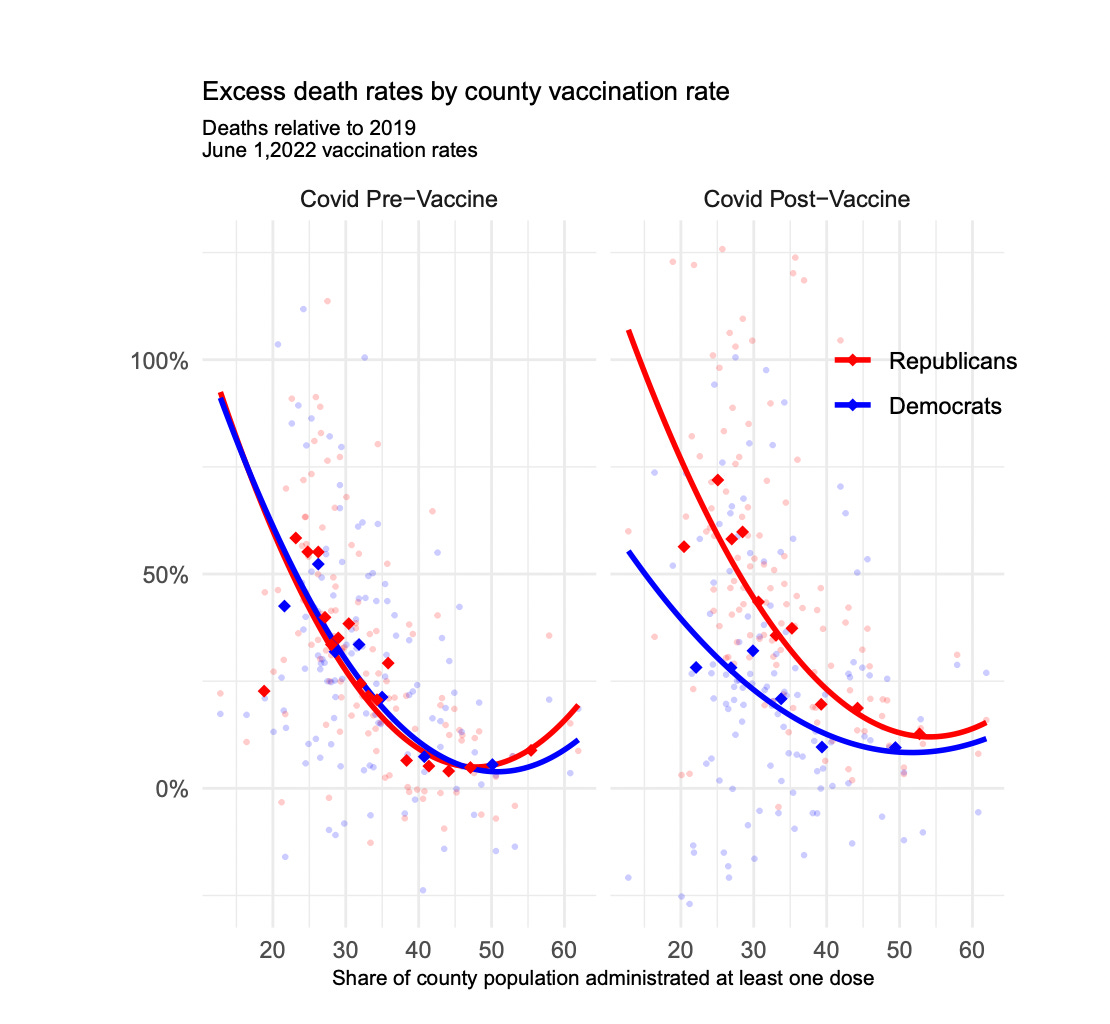Republican elites killed their own followers
A new study shows how political ideology can be deadly
Covid led to the death of many more people in the US than were necessary, Despite early wide-scale access to vaccines, US excess deaths outstripped peer countries. Even now it continues. Because of Covid, US life expectancy continues to drop dramatically even as life expectancy is rebounding in other countries.
What explains this particularly grim piece of American exceptionalism? One answer is political ideology. More specifically, conservatives are avoiding simple public health actions, like vaccines, that would protect themselves and others.
I wrote about this late last year. At that point the key takeaways were:
The ideological gap in public beliefs about the pandemic is much higher in the US than elsewhere
Covid cases and deaths are higher in more Republican counties
Republicans are more likely to believe misinformation about vaccines
Republicans are substantially less likely to get vaccinated
Exposure to conservative media (Fox News) makes people more vaccine hesitant
Taken together, this evidence suggests that right-wing elites — politicians and media — were shaping the beliefs of their followers in ways that hurt those followers.
A new paper by three Yale researchers, Jacob Wallace, Paul Goldsmith-Pinkham and Jason Schwartz offers the most definitive evidence I’ve seen thus far confirming that Republicans were more likely to die because of Covid, the scale of these deaths, and the centrality of vaccine hesitancy.1
While much prior work relied either on surveys of beliefs, or evidence of vaccines and deaths at the county level, this paper connects individual-level data on political affiliation (voter registration in Florida and Ohio), age, and deaths. Using this data, it calculates and compares excess death rates of Republicans and Democrats.2
What did the authors find?
Overall, the excess death rate for Republicans was 5.4 percentage points, or 76%, higher than the excess death rate for Democrats.
The figure below explains the key finding of the paper: a spike in excess deaths around the time of the pandemic, and then a growing difference between Republicans and Democrats in the rate of excess deaths.
The graphs also show the gap between Democrats and Republicans becomes noticeable only after vaccines become widely available. In other words, absent the vaccines, the effect of partisan ideology was not very large. But when people gained the ability to choose to take the most powerful step to protect themselves and others, Republican and Democratic outcomes vary.
The obvious conclusion is that more Democrats got vaccines and more lived. Fewer Republicans did and more died.
The figure below reiterates this point. Before vaccine availability, excess deaths are similar for Democrats and Republicans. After vaccines become available, the two groups separate: the excess death rate gap between Republicans and Democrats increases from 1.6 percentage points to 10.4 percentage points. In counties with very high vaccination rates, Republicans behave much like Democrats, and also have lower excess deaths.
The people who caused these deaths should be held accountable
The pandemic has battered people’s faith in public health institutions, especially the CDC. This is, again, driven by political differences, reflecting a Republican narrative that government botched the pandemic.
The failures of government will be closely scrutinized but public health is a co-production between the citizens and government. It relies on the voluntary engagement of citizens to follow the guidance of government. Most other peer countries did a lot better with that co-production than the United States. One key difference is that in the United States right-wing leaders and media sought to sabotage the co-production.
One way in which they did this was to cast doubt on the need for, and efficacy and safety of, vaccines.
As Matt Gertz has documented, this campaign is ongoing. Fox is still raising doubts about vaccinations because it remains “great for ratings.” While there is always the question of causality — is Fox merely responding to the preferences of their viewers, or shaping them — another new study offers evidence that Fox, and Carlson in particular, increased vaccine hesitancy.



There has been no real penalty for stoking vaccine hesitancy. For example, Ron Johnson, has pushed doubts about vaccines even in an election year. Once Biden became President, Republicans amplified the claims that vaccines posed a threat to freedom and aligned with anti-vaccine activists. In some cases, state lawmakers discouraged outreach efforts.
Indeed, embracing vaccines has become politically risky. One of the Trump administration’s most positive achievements was in pushing for rapid vaccine development. But Trump himself has struggled to take credit. When he mentioned he got a booster shot at one of his rallies, he was booed. It turns out that when you plant the seed of anti-science doubt — recall Trump giving credence to the false claim that vaccines cause autism — it is hard to reap the benefits of science.
We can extend Trump’s penetrating analysis of the power of ideology — "I could stand in the middle of Fifth Avenue and shoot somebody, and I wouldn't lose any voters" — to assume that he could shoot his own supporters and not lose support.
This sounds like a stark claim, one that most coverage of ideological divides around public health will shy away from. But we need to be honest about why such deaths happened. Right-wing elites made a choice to engage in rhetoric and feed conspiracies that killed their own supporters, because it won them votes or ratings.
It’s highly unlikely there will be any real reckoning for the slew of unnecessary deaths. But there should be. We should care more about this. Our system of representative governments relies on the public being able to assume that the politicians they support have their best interests at heart, and can be trusted to look after them. This is a case where that assumption is demonstrably untrue, with tragic results.
The paper was released by the National Bureau of Economic Research. It is important to note NBER papers are not peer-reviewed. However, they are generally very high-quality research. Peer review can take years for economic journals so it is standard to release papers like this before they are accepted for peer review.
The use of excess death rates — that is, deaths above expected normal levels — addresses concerns that GOP voters are different in some ways from Democrats that are correlated with mortality, such as age or health, or access to health services, that limit our confidence in knowing if its really political ideology or other factors that explain the difference in health outcomes.





I'm already angry -- but this documentation of wrong-doing makes me sad.